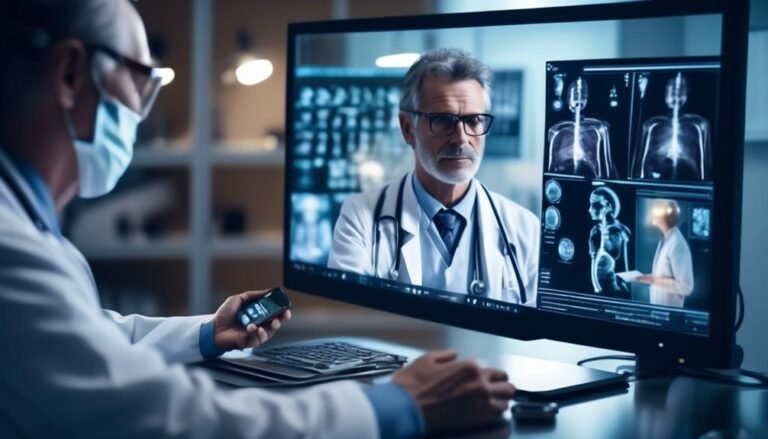Building a Successful Career in Healthcare Informatics
The field of healthcare informatics is rapidly evolving, offering numerous opportunities for professionals to make a meaningful impact on the healthcare industry.
With the increasing reliance on technology and data in healthcare delivery, the demand for skilled informaticians continues to grow.
From leveraging data analytics to improving patient care outcomes, healthcare informatics presents a dynamic and rewarding career path.
Understanding the nuances of this field, the educational requirements, and the essential skills needed to thrive in healthcare informatics are crucial for those aspiring to build a successful career in this domain.
Key Takeaways
- Healthcare informatics optimizes patient care and organizational efficiency through the interplay between healthcare systems, technology, and data management.
- Healthcare technology enables efficient data collection and access for informed decision-making and improved patient outcomes.
- Understanding the interplay between healthcare technology and data management is essential for driving innovation and optimizing healthcare delivery.
- Technical proficiency in database management and programming languages, as well as analytical skills, are crucial for managing and analyzing healthcare data.
Understanding Healthcare Informatics
Understanding Healthcare Informatics involves mastering the intricate interplay between healthcare systems, technology, and data management to optimize patient care and organizational efficiency.
Healthcare technology plays a pivotal role in modern healthcare systems, encompassing electronic health records (EHR), telemedicine, wearable devices, and healthcare analytics tools. These technologies enable healthcare professionals to collect, store, and access patient data efficiently, leading to more informed decision-making and improved patient outcomes.
Data management is equally critical in healthcare informatics, as it involves organizing, securing, and analyzing vast amounts of healthcare data to derive meaningful insights. Effective data management ensures data accuracy, integrity, and accessibility, which are essential for supporting clinical decision-making, research, and healthcare administration. Furthermore, it plays a crucial role in meeting regulatory requirements and protecting patient privacy.
As the healthcare industry continues to embrace digital transformation, understanding the interplay between healthcare technology and data management is fundamental for healthcare informaticians to drive innovation, enhance patient care, and optimize healthcare delivery.
Education and Training Requirements
Mastery of healthcare informatics necessitates a comprehensive education and training background that integrates knowledge of healthcare systems, technology, and data management. Professionals in this field typically need a strong foundation in both healthcare and information technology.
The education requirements for healthcare informatics often include:
- A solid understanding of healthcare systems and processes
- Proficiency in various information technologies and data analysis tools
- Knowledge of regulatory and compliance requirements in healthcare
In addition to formal education, specialized training programs focused on healthcare informatics are highly beneficial for individuals seeking to excel in this field. These programs often cover topics such as electronic health records (EHR) management, healthcare data analysis, and information security.
Furthermore, certifications such as Certified Health Data Analyst (CHDA) or Certified Professional in Healthcare Information and Management Systems (CPHIMS) can enhance one's credibility and demonstrate expertise in healthcare informatics. For those aiming for advanced roles in the field, pursuing advanced degrees such as a Master of Science in Health Informatics or a Master of Health Administration (MHA) can provide a deeper understanding of the complex intersection between healthcare and technology.
Developing Technical and Analytical Skills
To excel in healthcare informatics, professionals must cultivate technical proficiency and an analytical mindset.
Developing strong technical skills, such as proficiency in database management and programming languages, is crucial for effectively managing and analyzing healthcare data.
Additionally, honing an analytical mindset enables professionals to derive meaningful insights from complex datasets and contribute to evidence-based decision-making in healthcare settings.
Technical Proficiency
Developing technical and analytical skills is essential for a successful career in healthcare informatics, as it enables professionals to effectively manage, analyze, and interpret complex healthcare data. This proficiency is crucial for various aspects of healthcare informatics, including data management, system implementation, and data analysis.
- Data management: Proficiency in data management involves the ability to organize and maintain large volumes of healthcare data, ensuring its accuracy, security, and accessibility.
- System implementation: Healthcare informatics professionals must possess the technical expertise to implement information systems that facilitate the collection, storage, and retrieval of healthcare data, contributing to improved patient care and organizational efficiency.
- Data analysis: Analytical skills are essential for interpreting healthcare data to identify trends, patterns, and insights that can inform decision-making and drive improvements in patient outcomes and operational processes.
Analytical Mindset
Professionals in healthcare informatics must cultivate a keen analytical mindset, honing their technical and data interpretation skills to effectively navigate the complexities of healthcare data and drive informed decision-making.
Critical thinking is essential for interpreting data accurately and deriving meaningful insights. It involves the ability to evaluate information objectively, identify patterns, and draw logical conclusions.
Problem-solving skills are also paramount, as healthcare informaticians frequently encounter complex data-related challenges that require innovative solutions. Developing the capacity to approach problems systematically, analyze data comprehensively, and propose effective strategies is crucial.
By honing these analytical skills, professionals can contribute significantly to improving healthcare outcomes, enhancing operational efficiencies, and advancing patient care.
Ultimately, an analytical mindset empowers healthcare informaticians to harness the potential of data to drive meaningful change and innovation within the healthcare industry.
Gaining Practical Experience
Gaining practical experience in healthcare informatics is essential for developing a comprehensive understanding of the field. This can be achieved through internships and shadowing, providing valuable exposure to real-world applications of informatics in healthcare settings.
Additionally, hands-on projects and clinical exposure offer opportunities to apply theoretical knowledge to practical scenarios, further enhancing skills and knowledge in healthcare informatics.
Internships and Shadowing
To gain practical experience in healthcare informatics, aspiring professionals can seek internships or shadowing opportunities in a variety of healthcare settings. This hands-on experience provides valuable insights into the real-world application of informatics in clinical, administrative, and research environments.
The benefits of pursuing internships or shadowing include:
- Practical experience: Engaging in actual informatics projects and tasks.
- Networking opportunities: Connecting with professionals in the field and building relationships.
- Real world exposure: Observing informatics systems and processes in action.
Hands-On Projects
Engaging in hands-on projects is crucial for gaining practical experience in healthcare informatics, allowing professionals to apply theoretical knowledge to real-world scenarios. These projects provide an opportunity to develop practical skills and gain insights into real world applications of healthcare informatics. By working on hands-on projects, professionals can enhance their ability to analyze complex healthcare data, design and implement information systems, and improve healthcare processes. The following table highlights the benefits of hands-on projects in gaining practical experience in healthcare informatics:
| Benefits of Hands-On Projects | |
|---|---|
| Application of theoretical knowledge | Development of practical skills |
| Insight into real world applications | Enhancement of problem-solving abilities |
Engaging in hands-on projects not only allows professionals to apply their theoretical knowledge but also helps them develop essential practical skills for success in the field of healthcare informatics.
Clinical Exposure
For professionals in healthcare informatics, acquiring clinical exposure is essential for gaining practical experience and understanding the real-world applications of informatics in healthcare settings.
Clinical exposure provides hands-on learning opportunities and allows professionals to witness informatics solutions in action. It enables individuals to observe how data and technology are utilized to improve patient care, streamline processes, and enhance healthcare outcomes.
Through clinical exposure, professionals can interact with healthcare providers, understand their needs and challenges, and directly contribute to the development and implementation of informatics solutions.
This real-world experience is invaluable for honing skills, gaining insights into the complexities of healthcare systems, and ensuring that informatics solutions effectively meet the demands of diverse clinical environments.
Navigating Career Paths in Healthcare Informatics
Navigating career paths in healthcare informatics requires a comprehensive understanding of the industry's evolving technology, regulatory requirements, and data management practices. Professionals in this field have a wide array of job opportunities and avenues for career advancement. The table below outlines some common job titles and their corresponding responsibilities in healthcare informatics.
| Job Title | Responsibilities |
|---|---|
| Health Informatics | Analyzing healthcare data to improve patient outcomes and efficiency |
| Analyst | Evaluating and implementing technology solutions for healthcare data |
| Clinical Informatics | Integrating healthcare data and information for improved patient care |
| Informatics Nurse | Using data to improve nursing practices and patient care |
| Health Information Manager | Overseeing the security and accuracy of electronic health records |
As the healthcare industry continues to prioritize digital transformation, the demand for professionals in healthcare informatics is expected to grow. Individuals aspiring to advance in this field should consider acquiring specialized certifications and staying abreast of the latest technological advancements and regulatory changes. By doing so, they can position themselves for fulfilling careers in healthcare informatics.
Professional Networking and Continued Learning
In the dynamic landscape of healthcare informatics, maintaining a strong professional network and committing to continuous learning are essential for staying abreast of industry advancements and fostering career growth.
Professional networking offers opportunities for collaboration, mentorship, and exposure to diverse perspectives, while continued learning ensures that professionals remain knowledgeable about the latest trends and technologies.
To achieve these goals, individuals in healthcare informatics can engage in the following activities:
- Industry Events: Attending industry conferences, seminars, and workshops provides valuable networking opportunities and access to the latest industry insights and best practices.
- Certifications: Pursuing relevant certifications, such as CPHIMS (Certified Professional in Healthcare Information and Management Systems), demonstrates a commitment to ongoing professional development and can enhance career prospects.
- Online Forums and Webinars: Participating in online forums and attending webinars allows professionals to engage with peers, share knowledge, and stay updated on emerging trends and innovations in healthcare informatics.
Conclusion
In conclusion, building a successful career in healthcare informatics requires a strong understanding of the field, comprehensive education and training, technical and analytical skills, practical experience, and the ability to navigate various career paths.
Professional networking and continued learning are also crucial for ongoing success in this dynamic and rapidly evolving field. As the saying goes, 'knowledge is power,' and in healthcare informatics, staying informed and connected is key to achieving professional success.







